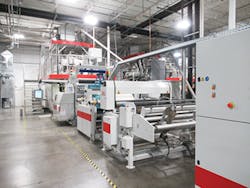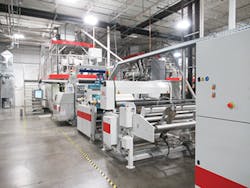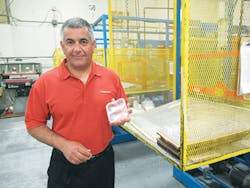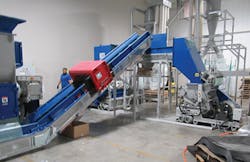The Lacerta Group does not wait until it finds new business before it orders more processing machinery. Every year, it forecasts business growth for the next three to five years and then buys equipment needed to support growth two years ahead.
It all adds up to success for the Mansfield, Mass., manufacturer of thermoformed packaging primarily for the food market.
The company has experienced double-digit growth for the past eight years and expects that to continue for the next five, according to Lacerta President Ali Lotfi.
"We don't wait for business to come in and then justify that we have to purchase a piece of equipment," Lotfi said. "We always order equipment a year or two ahead of time. We have never had to look for work. We have always been able to bring in the work we need."
A lot of factors have contributed to Lacerta's growth, but significant investment in equipment for designing and making molds, along with having available processing capacity whenever a customer needs packaging, has been important.
"We have invested in a lot of CNC and mold-making capacity," Lotfi said. "Designing packages, making prototypes, building production molds all in-house at a lower cost has given us an edge in the market."
Lotfi was working for BASF in the early 1990s when he got the idea to start a business to recycle and reclaim components of data-storage products such as magnetic media, computer tapes and videotapes. It was successful, and one of the byproducts of the process was PET flake. He hit upon the idea of extruding the flake into sheet and making clear plastic packaging.
Polaroid, which was in the same building as the data-storage recycling business, gave Lotfi a contract for a clamshell package for its one-step camera.
With no background in packaging or thermoforming, Lotfi, his brother Mory and cousin Mostafa quoted the job, borrowed money to buy an LR-brand thermoformer, a Fadal CNC machine to make molds and a CAD system to design molds. They built the first mold, the thermoformer arrived and 10 days later they were shipping clamshell packages across the hall to Polaroid. Lacerta was launched.
The price for recycled PET dropped in the late 1990s, and the Lotfi family decided to focus on the company's growing packaging business.
The recession in 2008 helped focus Lacerta's business. "When the economy went down, we had five machines and jobs for one machine running one shift," Lotfi said. "We decided to focus on medical and food packaging. We built a clean room and bought more equipment," he said. "We were able to get through that period."
Lacerta later decided to exit the medical packaging business because of low volumes for most medical packaging and the slow pace of product development and regulatory approvals.
The fast-paced food packaging business, where designs change frequently and customers value quick development-to-production cycles, suited the Lotfi family. It still has some retail, industrial and cosmetics business, but the focus is on food.
Lacerta has a total of 250,000 square feet of production space in three buildings that are near each other but not adjacent. Trucks shuttle material and products between the buildings. One building is dedicated to design and production, one to finishing and printing and the third to extrusion, raw materials and roll stock.
Today, the company has 19 thermoforming lines. Sixteen lines — 11 from SencorpWhite and five from Kiefel — are for production, while three additional APM thermoformers are dedicated to product development. APM thermoformers are no longer manufactured but are good for development projects, Lotfi said.
Two of the production lines were delivered in July, one built by SencorpWhite and one by Kiefel. All thermoformers have an index width between 36 inches and 48 inches.
The average age of Lacerta's thermoforming lines is four years. Although one is 20 years old, the rest are seven years old or newer. New lines generally cost more than $1 million.
"As we grow, we need to buy equipment that gives us better flexibility, precision and speed," Lotfi said. "We market ourselves as providing speed to market. We need flexibility and speed internally from our team and from our equipment."
He said the company is considering replacing some of its 7-year-old thermoforming lines with newer lines that are faster and have better forming capability and control over the process.
"We make the decision in a very short time," Lotfi said. "We have this feeling that if we buy it, we can fill it."
Overall, Lacerta spent about $17 million on new equipment and purchasing a building last year. This year, it will spend about $7 million on new equipment. Next year, it will spend at least $18 million for 10 new extruders, two more thermoforming lines and some automated packaging lines.
A rail siding and silos for PET and PP also are being added next year.
When it buys a new line, Lacerta discusses its requirements with both SencorpWhite and Kiefel. Lacerta decides between the two companies' proposals based on delivery time and pricing.
The close relationships with SencorpWhite and Kiefel have paid off for Lacerta. "Both have stepped up with new equipment that can thermoform with more precision, more consistency from shot to shot and better speed."
He said both companies bring their customers to Lacerta to see equipment running. "We are always open to them," Lotfi said.
A 14-member team at Lacerta designs and builds all the master tooling for the machines. The team uses SolidWorks for design and has nine CNC machines from Fadal and Haas Automation. It also builds about 150 molds per year. Lotfi said the process from designing a mold to creating a production mold takes as little as one week.
The master tool on each thermoformer holds the mold and contains quick-connect fittings for water and vacuum lines plus easily accessible height and width adjustments. Lotfi said a complete mold change, which once took up to eight hours, takes about two and a half hours with Lacerta's master tooling. If it is not a complete changeover, the time is about 45 minutes. The company averages about six to seven mold changes per day.
Lacerta also builds its own end-of-arm-tooling for the robots.
Robots have been added to all of Lacerta's lines within the past three years and the new lines come with robots. "Everything we buy is configured downstream to handle products coming off the line.
"Everything is automated on our two new production lines, including inspection, sampling, putting the product into the box and palletizing boxes," Lotfi said.
Manufacturing as much of its own sheet as possible is another important factor in Lacerta's business strategy. "If we buy material from outside, we generally have to wait eight to 12 weeks for delivery," Lotfi said. "If we build a mold in four weeks and then have to wait on material to start production, we have lost our competitive edge."
That's where Lacerta's recycling operations come into play.
The company has two recycling lines for processing post-consumer PET flake directly into sheet. Each recycling line has two twin-screw extruders. With the 10 extruders it plans to buy next year, Lotfi said Lacerta will be able to process all the recycled material it needs.
Starlinger's Viscotec division supplied ViscoSheet recycling lines capable of processing post-consumer flake, in-house regrind, virgin resin or any combination of those materials. Each line can produce up to 2,500 pounds per hour and includes deCon 20 decontamination units to process post-consumer material so that it can be used in food packaging.
The ViscoSheet lines also include continuous gravimetric dosing units and fully automatic winders.
Lacerta also has two granulators from Zerma Machinery & Recycling Technology.
Another line from a different manufacturer that Lotfi declined to identify is scheduled for delivery in August that will be used for seven-layer PP barrier sheet extrusion.
A shrink-sleeve line is being installed. Lacerta also has extensive printing capability, including printing high-gloss labels that are sandwiched between layers of the container walls.
Lacerta's business is split evenly between custom products it manufactures for customers and stock products. It concentrates on smaller containers. One of the keys to the success of Lacerta's stock product offerings has been innovation, Lotfi said.
"Our packages are more up-to-date in terms of design and simplicity. The focus is on the food and the consumer's experience in dealing with the package," he said. "It has been a formula that has worked very well for us."
Two years ago, Lotfi and the Lacerta design team developed the Fresh N' Sealed line, which has a plastic strip that has to be pulled off to open the container for the first time. "Tamper-evident packaging is very important now," he said in describing the patented container seal.
Lotfi said the company also has created a patented salad container that will debut with a major supermarket chain in the fourth quarter of this year.
While all of Lacerta's manufacturing takes place in Mansfield, near Boston, the company ships products throughout the Americas. A container of Fresh N' Sealed packages was recently shipped to Australia.
Production currently runs 24/5, and Lotfi said it has been a struggle to find employees to ramp up to 24/7 production.
"Lack of people is definitely holding us back right now," he said. "Last year, we had to pull back a little bit from the market to support our current customers instead of taking on new projects. We could be growing at 30 percent a year if we had people," Lotfi said.
He said the high cost of living in the Boston area hinders Lacerta's ability to attract people to the area and there is not a good base of people with manufacturing skills already there.
Lacerta has considered building a plant in another part of the country but does not feel it can send trained staff to run it.
"If we can purchase a thermoformer that already has the staff, we could do something like that. But it is difficult," Lotfi said.
The next generation of the family is already working at the company. Lofti's daughter works in marketing and product development and his cousin's two sons are engineers.
Ron Shinn, editor
Contact:
Lacerta Group Inc.
Mansfield, Mass., 508-339-3312
About the Author
Ron Shinn
Editor
Editor Ron Shinn is a co-founder of Plastics Machinery & Manufacturing and has been covering the plastics industry for more than 35 years. He leads the editorial team, directs coverage and sets the editorial calendar. He also writes features, including the Talking Points column and On the Factory Floor, and covers recycling and sustainability for PMM and Plastics Recycling.




